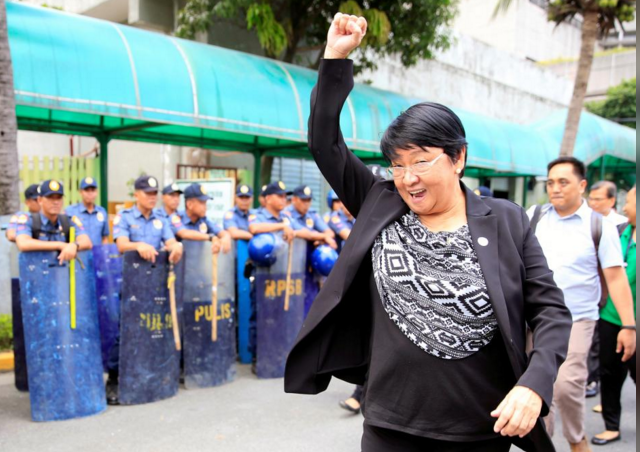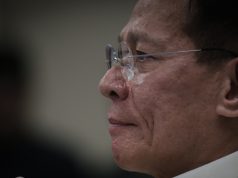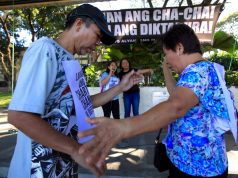
MANILA – The Commission on Appointments on Wednesday rejected Wednesday with finality the nomination of Social Welfare Secretary Judy Taguiwalo, but the bicameral body refused to name the lawmakers who voted to reject her or their reasons, citing strict confidentiality rules.
“You know, we’re expecting that kind of question, and that is one thing that happened inside the executive session, and whatever happens in the executive session, we cannot divulge that in public. So I’m very sorry, people have been asking that question, but we can’t say, we cannot divulge in public how many voted, total number of votes. We can’t say how many voted for or against, or anything else that we discussed during the executive session. That’s the rule,” Rep. Joel Mayo Almario, chair of the CA’s labor and social welfare committee said.
Almario, who moved as committee chairman to reject Taguiwalo’s ad interim appointment, likewise refused to discuss the issues that ultimately weighed against the DSWD chief, listed as one of the “leftists” in the Duterte cabinet.
Pressed by Bloomberg TV Philippines’ “The Big Story” anchor Roby Alampay to discuss even briefly these issues, Almario stood firm on being mum: “No. Ahh, those were discussed but because it happened inside and within and during the executive session, that’s about it. We cannot divulge it.”
Alampay asked him to at least explain to the public, “what exactly is the sensitivity to discussing these things. What exactly is the sensitivity to telling the public how many people voted for or against her, or even discussing what the issues were.”
Almario replied that, “it’s because when we come to a voting, there are always pressures coming from all sides also. And we don’t want any member to vote against his conscience. We don’t want any member to vote because he was told to. That’s the logic behind the executive session — I mean the secret voting during the executive session, so that nobody will know, who among the members voted for or against the appointee.”
Transparency and accountability on the part of the CA members, said Almario, is something for “the public to think about because we don’t have to be accountable to the public on our decision. We based our decision on what we learned about the nominee based on the answers, based on the investigative reports and based on whatever we hear of the nominee from anywhere. For Secretary Taguiwalo, we heard her many times. We even conducted our own personal interview of people working in her office. Some of them, the Secretary knew them. Some of them, the Secretary didn’t know. But we did that, and even in the regional level. And we even heard the views of the other congressmen who are not members of the Commission on Appointment. And there were those who offered what they know about the appointee and we took that into our hands and made that a part of our total evaluation of the Secretary.”
When Alampay asked if Taguiwalo’s background as a leftist was “ultimately an issue for people who were voting for or against her,” Almario conceded, “I would suppose that that was also counted. But I cannot say if that’s the main reason.”
He added: “You know, when we go into voting, we just say that we now come into voting. Then we’re given ballots and then you put your vote whether you are for the confirmation or for the rejection. You don’t put your name. You don’t put a reason. You don’t even have to identify the ballot that it’s yours. So once the voting is done, it’s all between you and your god. Nobody knows what your reasons are in voting the way you voted.”
He acknowledged the irony – as noted by Alampay – of hearing only those in support of Taguiwalo as speaking up after the closed-door voting, “and yet nobody wants to explain why ultimately she was rejected.”
Almario said everyone had to abide by the rule that “once we reach 13 or majority, then we stop counting so assuming that there are… assuming ha, I’m not saying this happened but assuming… the negative votes reach 13 and there were let’s say 2 positive votes then we just stop counting because the umber 13 was already reached. So you wouldn’t know what the vote in the remaining ballots are whether they are for or against.”









